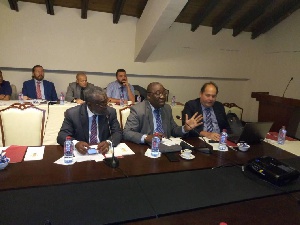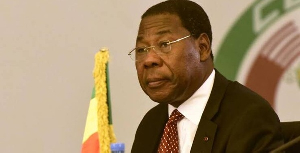Ghana will begin the decontamination of all imports coming into the country from January 2018.
The Ghana Health Service to this end has signed a Memorandum of Understanding with crisis management and prevention company, LCB Worldwide to execute the project.
It is part of measures to activate International Health Regulations (IHR) through biosecurity in the country. This comes in handy, following revelations by the Minister of Health that the 4 students of Kumasi Academy died of H1N1 Type A influenza necessitating the need for the country to be proactive in dealing with the issue.
Biosecurity is an integrated approach to managing risk to human, animal and plant life and health. The International Health Regulations recommends routine and emergency measures at designated points of entry and these include decontamination procedures at international container terminals, ports, airports and ground crossing.
Indeed in 2007 Ghana alongside other member states of the World Health Organisation (WHO) enforced the IHR. In 2012, Ghana extrapolated same into her national laws by virtue of the Public Sector Act, Act 851.
LCB Worldwide will deploy about 8 disinfection delivery tunnels in the ports of Tema and Takoradi and the various entry points in the country. LCB Worldwide has already put in place all the facilities that will decontaminate goods entering the country. The move is to ensure early recognition of emerging pest and disease threats, allow integrated responses to threats, rationalisation of controls and improved emergency preparedness and response. Dr, Anthony Nsiah Asare, the Director General of the Ghana Health Service at a stakeholder meeting to discuss the implementation of the decontamination programme emphasised the importance of such an exercise to the socio-economic development of the country.
According to him, Ghana must not be left behind in an era when the world is enhancing measures and adopting preventive mechanisms to crisis. According to the United Nations Development Group, West Africa alone may lose as much as 3.6 billion dollars per year between 2014 and 2017 due to a decrease in trade, closing of borders, flight cancellations and reduced foreign direct investment and tourism activity, fuelled by stigma.
LCB Worldwide will be working in accordance with recommendations of the World Health Organisation and under the direct supervision of the Ghana Health Service. The company will carry out the disinfection exercise at the ports and points of entry without any additional delays at the designated places.
The project will offer gains to all stakeholders and will serve as a marketing tool and strategy for importers and exporters who will assure clients of safe and secure handling of their goods coming into the country.
Following from the implementation of the programme, Ghana’s ports will be positioned as the preferred destination for trade due to the fact that the disinfection will provide extra security and Ghana will stand out as the first in the West African sub region to implement the IHR.
It is clear that keeping Ghana from bio hazardous infectious diseases requires a great amount of coordination with all stakeholders, perhaps the reason why the event was patronised by major stakeholders including the Ghana Ports and Harbours Authority, the Importers and Exporters association of Ghana, the Ghana Shippers’ Authority, the Ghana Union of Traders Association GUTA, the Ghana Institute of Freight Forwarders, the Association of Customs House Agents Ghana ACHAG, the Food and Drugs Authority and the Customs Brokers Association of Ghana CUBAG among others.
Health News of Monday, 11 December 2017
Source: Kennedy Banunkae













